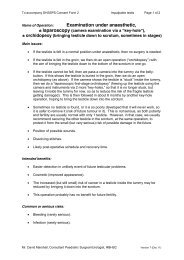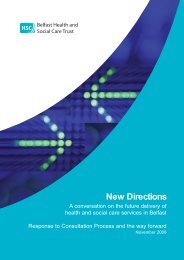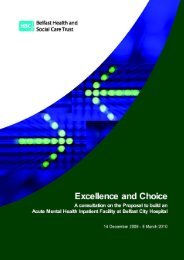Excellence and Choice in Older Peoples Services - Belfast Health ...
Excellence and Choice in Older Peoples Services - Belfast Health ...
Excellence and Choice in Older Peoples Services - Belfast Health ...
You also want an ePaper? Increase the reach of your titles
YUMPU automatically turns print PDFs into web optimized ePapers that Google loves.
<strong>Excellence</strong> & <strong>Choice</strong><br />
A Consultation on <strong>Older</strong> People’s <strong>Services</strong><br />
January 2009
CONTENTS<br />
1. Introduction ...................................................................................................3<br />
2. Guid<strong>in</strong>g pr<strong>in</strong>ciples for the delivery of services for older people .....................5<br />
3. How are services for older people currently delivered?.................................7<br />
4. What are the current & future dem<strong>and</strong>s on services for older people? .........9<br />
5. What <strong>in</strong>fluences the changes required <strong>in</strong> current services? ........................12<br />
6. How will services be delivered <strong>in</strong> the future?...............................................19<br />
Page 2 of 28
1. INTRODUCTION<br />
The right care <strong>in</strong> the right place<br />
<strong>Belfast</strong> <strong>Health</strong> <strong>and</strong> Social Care Trust was formed <strong>in</strong> April 2007 from the merger of six<br />
Trusts. Four of these were acute Trusts – The Royal Hospitals, <strong>Belfast</strong> City Hospital<br />
the Mater Hospital <strong>and</strong> Green Park. Two were community Trusts, serv<strong>in</strong>g North <strong>and</strong><br />
West <strong>and</strong> South <strong>and</strong> East <strong>Belfast</strong>.<br />
The new <strong>Belfast</strong> Trust is work<strong>in</strong>g to build on the f<strong>in</strong>e legacy of care we have <strong>in</strong>herited<br />
from these Trusts – by jo<strong>in</strong><strong>in</strong>g up hospital <strong>and</strong> community services <strong>in</strong> a way that gives<br />
people choices <strong>and</strong> offers the right care <strong>in</strong> the right place.<br />
We are also mak<strong>in</strong>g sure there is no unnecessary duplication of services <strong>and</strong> that we<br />
keep try<strong>in</strong>g to f<strong>in</strong>d better ways of provid<strong>in</strong>g high quality care.<br />
In addition, our modernisation programme is help<strong>in</strong>g us f<strong>in</strong>d the significant efficiency<br />
sav<strong>in</strong>gs that the Northern Irel<strong>and</strong> Assembly has asked all public bodies to make.<br />
<strong>Belfast</strong> Trust’s overall purpose is to improve health <strong>and</strong> wellbe<strong>in</strong>g <strong>and</strong> reduce health<br />
<strong>in</strong>equalities – putt<strong>in</strong>g people’s needs at the centre of all decisions, provid<strong>in</strong>g services<br />
locally where possible <strong>and</strong> mak<strong>in</strong>g the best use of all our build<strong>in</strong>gs <strong>and</strong> other<br />
resources.<br />
We began a conversation on the future delivery of health <strong>and</strong> social care services <strong>in</strong><br />
<strong>Belfast</strong> <strong>in</strong> 2008 when we expla<strong>in</strong>ed the way we want to do th<strong>in</strong>gs <strong>in</strong> the future for the<br />
benefit of service users. The citizens of <strong>Belfast</strong> gave these proposals – outl<strong>in</strong>ed <strong>in</strong> a<br />
document called New Directions – a fair hear<strong>in</strong>g <strong>and</strong> encouraged us to proceed.<br />
In look<strong>in</strong>g at how we might best provide services for older people <strong>in</strong> <strong>Belfast</strong> <strong>in</strong> the<br />
future we asked one simple question -<br />
Where do I go if I need support because I am an older person?<br />
The model of care favoured by the Trust is that older people should be ma<strong>in</strong>ta<strong>in</strong>ed <strong>in</strong><br />
their own homes, supported by a network of care services that enable them to<br />
ma<strong>in</strong>ta<strong>in</strong> their quality of life.<br />
This is <strong>in</strong> l<strong>in</strong>e with the choices that many older people are already mak<strong>in</strong>g. Many<br />
documents commission<strong>in</strong>g services have also highlighted the need to promote health<br />
<strong>and</strong> wellbe<strong>in</strong>g by work<strong>in</strong>g <strong>in</strong> partnership with, for example, the hous<strong>in</strong>g sector to<br />
maximise <strong>in</strong>dependence, provide a range of long term liv<strong>in</strong>g options <strong>and</strong> improve<br />
services for people suffer<strong>in</strong>g from dementia.<br />
This document describes the range of services we provide for older people, how we<br />
are redesign<strong>in</strong>g them <strong>and</strong> our commitment to ensur<strong>in</strong>g <strong>in</strong>tegrated acute <strong>and</strong><br />
community care. For example we are redesign<strong>in</strong>g our specialist acute <strong>and</strong><br />
rehabilitation services, look<strong>in</strong>g at what care we provide <strong>in</strong> hospital <strong>and</strong> what care we<br />
provide <strong>in</strong> the community. We are also streaml<strong>in</strong><strong>in</strong>g our day hospitals <strong>and</strong> reform<strong>in</strong>g<br />
domiciliary (home) care, review<strong>in</strong>g how we support carers <strong>and</strong> develop<strong>in</strong>g our<br />
workforce.<br />
Page 3 of 28
As part of the way services are develop<strong>in</strong>g we believe for example that older people<br />
will be rely<strong>in</strong>g less on residential homes when choos<strong>in</strong>g the type of support or care<br />
they want.<br />
By develop<strong>in</strong>g a fuller range of long term liv<strong>in</strong>g options, <strong>in</strong> partnership with hous<strong>in</strong>g<br />
providers <strong>and</strong> the <strong>in</strong>dependent sector, we know we can provide these residential<br />
services <strong>in</strong> more appropriate sett<strong>in</strong>gs.<br />
Therefore, follow<strong>in</strong>g this consultation, we would beg<strong>in</strong>, as a matter of policy to phase<br />
out permanent admissions to our statutory residential homes with the exception of<br />
those homes provid<strong>in</strong>g specialist care eg. for people with dementia.<br />
If you live <strong>in</strong> a residential home now, please be assured that we respect the fact that<br />
it is your home <strong>and</strong> no changes about your support <strong>and</strong> care will be made without<br />
your agreement. If at some po<strong>in</strong>t <strong>in</strong> the future we are propos<strong>in</strong>g to change the use of<br />
some of our residential homes we will formally consult fully with residents, their<br />
relatives <strong>and</strong> staff of the homes.<br />
But we are ask<strong>in</strong>g for your support <strong>and</strong> underst<strong>and</strong><strong>in</strong>g about the changes we propose<br />
to make <strong>in</strong> the future. Between now <strong>and</strong> March 26 we are seek<strong>in</strong>g the broadest<br />
possible discussion on the way forward <strong>in</strong> services for older people. If there is<br />
agreement on the approach outl<strong>in</strong>ed <strong>in</strong> this document, we would beg<strong>in</strong> to phase out<br />
the policy of us<strong>in</strong>g our statutory residential homes as permanent homes <strong>and</strong> focus<br />
<strong>in</strong>stead on ma<strong>in</strong>ta<strong>in</strong><strong>in</strong>g people <strong>in</strong> their own homes with an appropriate level of<br />
support.<br />
This document is ask<strong>in</strong>g for your underst<strong>and</strong><strong>in</strong>g <strong>and</strong> support for the way <strong>in</strong> which we<br />
move forward. The views of older people, their carers <strong>and</strong> families, elected<br />
representatives <strong>and</strong> others look<strong>in</strong>g to the choices they want to have <strong>in</strong> <strong>Belfast</strong> when<br />
they get older are central to everyth<strong>in</strong>g we do. I hope people will cont<strong>in</strong>ue to give us<br />
a fair hear<strong>in</strong>g <strong>and</strong> also give us their views so that we can provide the highest possible<br />
quality care <strong>and</strong> support.<br />
William McKee<br />
Chief Executive<br />
Page 4 of 28
2. GUIDING PRINCIPLES FOR THE DELIVERY OF SERVICES TO OLDER<br />
PEOPLE<br />
The follow<strong>in</strong>g guid<strong>in</strong>g values <strong>and</strong> pr<strong>in</strong>ciples to underp<strong>in</strong> services have been<br />
developed from consultations with older people.<br />
Participation<br />
<strong>Older</strong> people <strong>and</strong> their carers will be <strong>in</strong>volved <strong>in</strong> the plann<strong>in</strong>g <strong>and</strong> development of<br />
their own health <strong>and</strong> social care services.<br />
Quality<br />
<strong>Services</strong> will be person centred.<br />
Effectiveness<br />
The right person for the right length of time will deliver services at the right time <strong>in</strong><br />
the right place.<br />
Dignity<br />
<strong>Services</strong> will ensure that older people’s dignity is ma<strong>in</strong>ta<strong>in</strong>ed throughout their<br />
experience of services.<br />
Inclusion <strong>and</strong> Equality<br />
<strong>Services</strong> should be accessible <strong>and</strong> usable by all older citizens.<br />
Independence<br />
<strong>Services</strong> should be designed to support older people’s <strong>in</strong>dependence <strong>in</strong> their own<br />
homes <strong>and</strong> communities.<br />
Rights<br />
<strong>Services</strong> should uphold the human rights of older people <strong>in</strong>clud<strong>in</strong>g those with<br />
complex needs.<br />
Honesty<br />
<strong>Services</strong> should be open <strong>and</strong> accountable.<br />
Page 5 of 28
Respect<br />
Attitudes to older people should reflect the contribution they have made<br />
throughout their lives.<br />
<strong>Choice</strong><br />
There should be a range of service options that provide real choice. In addition:<br />
- services will be <strong>in</strong>tegrated <strong>and</strong> provided on a <strong>Belfast</strong>-wide basis.<br />
- service improvement <strong>and</strong> modernisation will be based on best practice.<br />
- staff will be supported <strong>in</strong> their professional <strong>and</strong> personal development <strong>and</strong><br />
- services will be delivered <strong>in</strong> an efficient <strong>and</strong> effective way with<strong>in</strong> available<br />
resources.<br />
These pr<strong>in</strong>ciples are consistent with Eastern <strong>Health</strong> <strong>and</strong> Social <strong>Services</strong> Board’s<br />
Commission<strong>in</strong>g Strategy, Liv<strong>in</strong>g Fuller Lives (Bamford Review), Our Trust’s vision<br />
for health <strong>and</strong> social care - The <strong>Belfast</strong> Way, <strong>and</strong> our New Directions document<br />
Page 6 of 28
3. HOW ARE SERVICES FOR OLDER PEOPLE CURRENTLY DELIVERED?<br />
<strong>Health</strong> <strong>and</strong> Social Care <strong>Services</strong> have seen important changes <strong>in</strong> the way they<br />
are organised <strong>and</strong> delivered over the past 10-15 years.<br />
In the past, hospital care was the focus for older people’s services, provid<strong>in</strong>g the<br />
ma<strong>in</strong> acute, rehabilitation <strong>and</strong> long stay care for those who had become frail or<br />
cognitively impaired. Community care provided a limited range of services. More<br />
recently it was recognised that hospitals could not <strong>and</strong> should not be the model<br />
for support<strong>in</strong>g people to manage their long-term conditions.<br />
Over time services are be<strong>in</strong>g rebalanced. Key changes now mean that:<br />
• The majority of older people with significant needs receive their care <strong>in</strong> their<br />
own home.<br />
• Community Nurs<strong>in</strong>g <strong>Services</strong> are provided round the clock, <strong>in</strong>clud<strong>in</strong>g several<br />
areas of specialist support, i.e. diabetes, respiratory conditions, oncology, <strong>and</strong><br />
heart failure. These services help people manage their conditions at home,<br />
avoid<strong>in</strong>g frequent <strong>and</strong> disruptive admissions to hospital.<br />
• A new tier of community services known as Intermediate Care has been<br />
develop<strong>in</strong>g. These services focus on help<strong>in</strong>g older people achieve maximum<br />
<strong>in</strong>dependence follow<strong>in</strong>g a period of illness or the onset of disability for<br />
example, follow<strong>in</strong>g a stroke, fracture or complex health <strong>and</strong> social care issues.<br />
• New Integrated Community Teams have been or are be<strong>in</strong>g developed,<br />
improv<strong>in</strong>g team work<strong>in</strong>g across General Practice, District Nurs<strong>in</strong>g, Social<br />
Care, Care Management <strong>and</strong> Allied <strong>Health</strong> Professions.<br />
• There is better access to diagnosis <strong>and</strong> support for people with cognitive<br />
difficulties through the provision of Memory Cl<strong>in</strong>ics.<br />
• There are new services for people with dementia, <strong>in</strong>clud<strong>in</strong>g supported hous<strong>in</strong>g<br />
<strong>and</strong> a wider range of day support <strong>and</strong> specialist home care.<br />
Page 7 of 28
• Preventive aspects of care services have been strengthened through<br />
partnership work<strong>in</strong>g with key agencies. <strong>Health</strong>y Age<strong>in</strong>g Programmes <strong>and</strong><br />
<strong>in</strong>formation are now widely available across the city.<br />
These changes signal important shifts <strong>in</strong> the delivery of services for people with<br />
complex health <strong>and</strong> social care needs. This is the right th<strong>in</strong>g to do <strong>and</strong> it is what<br />
people want.<br />
Hospitals are <strong>in</strong>creas<strong>in</strong>gly focus<strong>in</strong>g on what they do best, provid<strong>in</strong>g high quality<br />
diagnostics, treatment <strong>and</strong> care with an emphasis on shorter lengths of stay <strong>and</strong><br />
better <strong>in</strong>tegration with primary <strong>and</strong> community care through clear pathways <strong>in</strong>to<br />
community services.<br />
However, much more rema<strong>in</strong>s to be done across the system to improve the<br />
health <strong>and</strong> well be<strong>in</strong>g of our older population. Important challenges <strong>in</strong>clude:<br />
• the earlier identification of people develop<strong>in</strong>g serious long-term conditions to<br />
ensure prompt treatment, rehabilitation <strong>and</strong> care, reduc<strong>in</strong>g disability <strong>and</strong><br />
enhanc<strong>in</strong>g quality of life.<br />
• improv<strong>in</strong>g acute stroke services, rehabilitation <strong>and</strong> community support.<br />
• better dementia services for people with challeng<strong>in</strong>g behaviours with a greater<br />
emphasis on skilled multi-discipl<strong>in</strong>ary assessment, treatment <strong>and</strong> care<br />
plann<strong>in</strong>g.<br />
• improved domiciliary care to improve access to high quality flexible services,<br />
which are available around the clock <strong>and</strong> can respond to the full range of<br />
needs.<br />
Page 8 of 28
4. WHAT ARE THE CURRENT AND FUTURE DEMANDS ON SERVICES FOR<br />
OLDER PEOPLE?<br />
Population age<strong>in</strong>g is a key driver for <strong>in</strong>ternational, national <strong>and</strong> local policies. It is<br />
well recognised that the conditions that account for most disease are primarily<br />
related to old age. <strong>Older</strong> people are the ma<strong>in</strong> users of hospitals <strong>and</strong> community<br />
health <strong>and</strong> social care services. The greatest concentration of health care costs<br />
occurs <strong>in</strong> the last year of a person’s life, whatever the age of death.<br />
Accord<strong>in</strong>g to population projections <strong>Belfast</strong> Trust’s older population will see a 5%<br />
decl<strong>in</strong>e <strong>in</strong> the number of 65-74 year olds <strong>and</strong> a 7% decl<strong>in</strong>e <strong>in</strong> 75-84 year olds.<br />
However, we expect to see a 22% <strong>in</strong>crease <strong>in</strong> the number of people aged 85 <strong>and</strong><br />
older.<br />
These demographic projections are likely to have a significant impact on the<br />
allocation of resources from those who fund our services <strong>in</strong> the next 10 years. At<br />
the same time the Trust will see an <strong>in</strong>crease <strong>in</strong> the numbers of the very old who<br />
tend to require more <strong>in</strong>tensive services.<br />
Availability of carers<br />
Demographic projections suggest that more people may need care <strong>in</strong> the future<br />
but there may be fewer carers. The Carers <strong>and</strong> Direct Payments Act (NI) 2002 is<br />
a reflection of the Government’s <strong>in</strong>tention to support carers through the provision<br />
of assessment <strong>and</strong> carers services or a direct payment to help them manage the<br />
dem<strong>and</strong>s of car<strong>in</strong>g.<br />
<strong>Belfast</strong> Trust has taken steps to improve support to carers through the<br />
appo<strong>in</strong>tment of two carer co-ord<strong>in</strong>ators who have developed a number of<br />
<strong>in</strong>itiatives to better support people who carry out this very important role.<br />
We recognise that carer identification <strong>and</strong> support is a high priority now <strong>and</strong> <strong>in</strong>to<br />
the future.<br />
Page 9 of 28
Expectations<br />
People <strong>in</strong>creas<strong>in</strong>gly expect services to be of high quality <strong>and</strong> tailored to their<br />
needs <strong>and</strong> wishes. Northern Irel<strong>and</strong> is also <strong>in</strong>creas<strong>in</strong>gly a multi-cultural society –<br />
<strong>and</strong> this also needs to be factored <strong>in</strong>to service plann<strong>in</strong>g.<br />
There is a cont<strong>in</strong>u<strong>in</strong>g need to change service design if we are to meet the<br />
expectations <strong>and</strong> dem<strong>and</strong> <strong>in</strong>to the future. These changes must: -<br />
- enable older people to rema<strong>in</strong> <strong>in</strong>dependent <strong>and</strong> active as they grow older<br />
<strong>and</strong><br />
- reduce the impact of crisis by putt<strong>in</strong>g <strong>in</strong> place services <strong>and</strong> systems, that can<br />
effectively respond to chronic <strong>and</strong> acute needs.<br />
This will mean reduc<strong>in</strong>g reliance on hospitals to provide the spectrum of services<br />
people need. It will mean ensur<strong>in</strong>g that those who need access to high quality<br />
acute care can easily access it <strong>and</strong> those who no longer require acute care<br />
cont<strong>in</strong>ue their rehabilitation <strong>and</strong> care pathway <strong>in</strong>to well developed primary <strong>and</strong><br />
community services.<br />
Workforce<br />
There are significant health <strong>and</strong> social care workforce issues to be addressed if<br />
we are to meet these strategic challenges.<br />
Key to these is the need to develop much greater specialist knowledge <strong>and</strong> skills<br />
about the needs of frail, vulnerable older people who need the greatest share of<br />
health <strong>and</strong> social care resources.<br />
Critical to this change will be the need for professional leadership to develop new<br />
ways of work<strong>in</strong>g with<strong>in</strong> <strong>in</strong>termediate primary <strong>and</strong> community care. Over time, key<br />
professional staff will be work<strong>in</strong>g across traditional organisational boundaries <strong>and</strong><br />
therefore work<strong>in</strong>g <strong>in</strong> new environments. The necessary acquisition of new skills<br />
<strong>and</strong> expertise needs to be developed <strong>in</strong> all sectors <strong>and</strong> by all discipl<strong>in</strong>es.<br />
Steps will also need to be taken to improve the recruitment <strong>and</strong> retention of basic<br />
grade staff work<strong>in</strong>g <strong>in</strong> domiciliary <strong>and</strong> community sett<strong>in</strong>gs.<br />
Page 10 of 28
The Trust will need to develop a workforce strategy to deliver on these key needs<br />
as well as work<strong>in</strong>g to provide guidance on implement<strong>in</strong>g the s<strong>in</strong>gle assessment<br />
process which streaml<strong>in</strong>es <strong>and</strong> co-ord<strong>in</strong>ates all the assessments an older person<br />
receives.<br />
Our success will be <strong>in</strong>fluenced by our ability to recruit <strong>and</strong> reta<strong>in</strong> staff across the<br />
full range of treatment, rehabilitation <strong>and</strong> care services.<br />
Examples of chang<strong>in</strong>g patterns of work<strong>in</strong>g <strong>in</strong>clude:<br />
- Integrated care teams work<strong>in</strong>g <strong>in</strong> primary care requir<strong>in</strong>g a range of<br />
professionals to develop shared vision <strong>and</strong> ways of work<strong>in</strong>g <strong>in</strong>clud<strong>in</strong>g, s<strong>in</strong>gle<br />
assessment processes, <strong>and</strong> jo<strong>in</strong>t tra<strong>in</strong><strong>in</strong>g.<br />
- Intermediate care teams compris<strong>in</strong>g a range of professionals work<strong>in</strong>g <strong>in</strong> an<br />
<strong>in</strong>tegrated model deliver<strong>in</strong>g rehabilitation <strong>and</strong> care <strong>in</strong> a range of sett<strong>in</strong>gs,<br />
<strong>in</strong>clud<strong>in</strong>g the private sector.<br />
- Specialist community nurs<strong>in</strong>g, work<strong>in</strong>g accident <strong>and</strong> emergency departments<br />
<strong>and</strong> wards, support<strong>in</strong>g effective discharge plann<strong>in</strong>g <strong>and</strong> the prevention of<br />
unnecessary admissions to hospital.<br />
- Geriatricians - previously exclusively hospital based - work<strong>in</strong>g on a sessional<br />
basis <strong>in</strong> the community support<strong>in</strong>g <strong>in</strong>termediate teams <strong>and</strong> primary care.<br />
- Mental health specialists work<strong>in</strong>g <strong>in</strong> <strong>in</strong>termediate care to support assessment<br />
<strong>and</strong> care plann<strong>in</strong>g for <strong>in</strong>dividuals with cognitive impairment.<br />
- <strong>Older</strong> people’s assessment <strong>and</strong> liaison services (OPALS) work<strong>in</strong>g <strong>in</strong><br />
hospitals <strong>and</strong> alongside medical, surgical <strong>and</strong> specialist services colleagues,<br />
ensur<strong>in</strong>g the knowledge <strong>and</strong> skills of old age specialists are available <strong>and</strong><br />
accessible.<br />
- Increas<strong>in</strong>g numbers of rehabilitation assistants deliver<strong>in</strong>g rehabilitation <strong>and</strong><br />
care packages.<br />
Page 11 of 28
5. WHAT INFLUENCES THE CHANGES REQUIRED IN CURRENT SERVICES?<br />
Eastern <strong>Health</strong> <strong>and</strong> Social <strong>Services</strong> Board Commission<strong>in</strong>g Strategy:<br />
<strong>Older</strong> People New Opportunities 2006-2016<br />
This strategy outl<strong>in</strong>es the commission<strong>in</strong>g priorities for <strong>Older</strong> <strong>Peoples</strong> <strong>Services</strong><br />
across the follow<strong>in</strong>g key themes.<br />
Promot<strong>in</strong>g <strong>Health</strong> <strong>and</strong> Wellbe<strong>in</strong>g<br />
This requires Trusts to work <strong>in</strong> partnership with others to ensure that ma<strong>in</strong>stream<br />
services such as transport, community safety, hous<strong>in</strong>g, Social Security, leisure<br />
<strong>and</strong> life-long learn<strong>in</strong>g are sensitive to the needs of the older population, <strong>and</strong> help<br />
promote active age<strong>in</strong>g.<br />
Maximis<strong>in</strong>g <strong>in</strong>dependence<br />
This requires Trusts to ensure that:<br />
- <strong>Older</strong> people’s care <strong>in</strong> hospital is properly co-ord<strong>in</strong>ated through access to the<br />
right specialists <strong>and</strong> care pathways.<br />
- Day Hospitals <strong>and</strong> Medical Assessment Units are reviewed to ensure they<br />
are accessible when needed <strong>and</strong> act as a resource to primary care.<br />
- Case management approaches are available to help people manage their<br />
long-term conditions, avoid<strong>in</strong>g repeat admissions to hospital where possible.<br />
- Appropriate co-ord<strong>in</strong>ated Out of Hours <strong>Services</strong> are available to respond to<br />
crisis.<br />
- There is sufficient capacity <strong>in</strong> community based assessment <strong>and</strong><br />
rehabilitation services to ensure that all older people get the opportunity to<br />
have rehabilitation <strong>and</strong> care.<br />
- The recommendations of the Regional Stroke Strategy are fully<br />
implemented.<br />
- A comprehensive service is <strong>in</strong> place for older people who fall to help prevent<br />
them fall<strong>in</strong>g <strong>in</strong> the future.<br />
Page 12 of 28
Long term liv<strong>in</strong>g options<br />
Trusts are required to ensure that:<br />
- Nurs<strong>in</strong>g homes are better supported <strong>in</strong> the care of patients with complex<br />
needs.<br />
- Partnership work<strong>in</strong>g with the hous<strong>in</strong>g sector is ma<strong>in</strong>ta<strong>in</strong>ed to exp<strong>and</strong><br />
supported hous<strong>in</strong>g schemes.<br />
- Domiciliary care services are exp<strong>and</strong>ed <strong>and</strong> improved<br />
- Statutory residential care is reviewed <strong>in</strong> light of <strong>in</strong>creased <strong>in</strong>vestment <strong>in</strong><br />
community services.<br />
Better dementia services <strong>and</strong> improved mental health<br />
This requires Trusts to ensure that:<br />
- Ma<strong>in</strong>stream health <strong>and</strong> social services recognise <strong>and</strong> address the specific<br />
needs of those with cognitive <strong>and</strong> mental health difficulties.<br />
- Community mental health teams are strengthened to respond to the needs of<br />
both early stage <strong>and</strong> complex needs.<br />
- Day hospitals <strong>and</strong> day services are reviewed.<br />
- Specialist domiciliary support is available.<br />
- Better respite services for carers are available.<br />
Bamford Review<br />
In 2002 the Department of <strong>Health</strong>, Social <strong>Services</strong> <strong>and</strong> Public Safety <strong>in</strong>itiated an<br />
<strong>in</strong>dependent review of all areas of mental health <strong>and</strong> learn<strong>in</strong>g disability <strong>in</strong>clud<strong>in</strong>g<br />
dementia. The report of the review specifically address<strong>in</strong>g people with dementia<br />
<strong>and</strong> older people with mental health issues is called Liv<strong>in</strong>g Fuller Lives.<br />
This document set out 55 recommendations. These set out areas where<br />
improvements <strong>in</strong> mental health <strong>and</strong> dementia services are required. These<br />
<strong>in</strong>clude:<br />
- Better access to early diagnosis <strong>and</strong> support<br />
- Susta<strong>in</strong>ed tra<strong>in</strong><strong>in</strong>g <strong>and</strong> education<br />
- Improved care <strong>in</strong> nurs<strong>in</strong>g <strong>and</strong> residential homes<br />
- Increased access to hous<strong>in</strong>g <strong>and</strong> technology options<br />
- Development of challeng<strong>in</strong>g behaviour services<br />
- Improved access to respite.<br />
Page 13 of 28
Comprehensive Spend<strong>in</strong>g Review<br />
In 2007, the Northern Irel<strong>and</strong> Executive published its Programme for Government,<br />
which <strong>in</strong>cluded proposals for efficiency sav<strong>in</strong>gs of 3% a year from 2008-2011<br />
across the whole health <strong>and</strong> care system. Full details of the impact of this can be<br />
found <strong>in</strong> the Trust’s overarch<strong>in</strong>g Equality Impact Assessment document.<br />
The implications of provid<strong>in</strong>g services with less <strong>in</strong>come are very challeng<strong>in</strong>g. The<br />
modernisation process <strong>in</strong> older people’s services is tak<strong>in</strong>g account of the f<strong>in</strong>ancial<br />
dem<strong>and</strong>s while balanc<strong>in</strong>g the need to streaml<strong>in</strong>e <strong>and</strong> improve services.<br />
In the wake of the efficiency sav<strong>in</strong>gs, older people services will be receiv<strong>in</strong>g<br />
significant new <strong>in</strong>vestment to modernise services. This important <strong>in</strong>vestment will<br />
have a positive <strong>and</strong> significant impact on the Trust’s ability to further enhance<br />
hospital <strong>and</strong> community services for older people.<br />
Page 14 of 28
Maximis<strong>in</strong>g Outcomes Resources Efficiencies (MORE)<br />
In order to manage the required efficiency sav<strong>in</strong>gs alongside new <strong>in</strong>vestment the<br />
Trust has carefully considered services across the six legacy Trusts <strong>in</strong> order to<br />
p<strong>in</strong>po<strong>in</strong>t areas where duplication was clear, modernisation was required <strong>and</strong><br />
services were under used<br />
The Trust’s MORE programmes facilitate the modernisation <strong>and</strong> streaml<strong>in</strong><strong>in</strong>g of<br />
these services which will deliver both improved services <strong>and</strong> a substantial<br />
element of the required efficiency sav<strong>in</strong>gs.<br />
<strong>Services</strong> undergo<strong>in</strong>g review with<strong>in</strong> <strong>Older</strong> People’s <strong>Services</strong> at present are:<br />
• Redesign of specialist acute medical <strong>and</strong> rehabilitation services for older<br />
people<br />
This <strong>in</strong>itiative <strong>in</strong>volves the reprovision of beds for the care of older people at<br />
<strong>Belfast</strong> City Hospital <strong>and</strong> the on the Royal Hospitals site. The build<strong>in</strong>gs where<br />
these services are located are no longer fit for purpose <strong>and</strong> distance from the<br />
ma<strong>in</strong> hospital has always presented difficulties <strong>in</strong> access<strong>in</strong>g cl<strong>in</strong>ical services.<br />
This new service will see the development of modern specialist acute, medical<br />
<strong>and</strong> rehabilitation wards with<strong>in</strong> the ma<strong>in</strong> hospitals at the <strong>Belfast</strong> City Hospital<br />
<strong>and</strong> the Royal.<br />
These acute <strong>in</strong>patient services will have fewer beds. Instead they will be<br />
supported by a range of new services that will focus on mak<strong>in</strong>g sure that the<br />
appropriate doctor sees the right patient - <strong>and</strong> the patient receives the most<br />
effective treatment <strong>and</strong> is discharged when ready to cont<strong>in</strong>ue their<br />
rehabilitation at home or <strong>in</strong> an appropriate community environment.<br />
Page 15 of 28
• Dementia services<br />
This work <strong>in</strong>volves review<strong>in</strong>g the current role of the <strong>in</strong>patient beds at<br />
Knockbracken <strong>Health</strong>care Park.<br />
The purpose of the review is to ensure that <strong>in</strong>patient resources are used<br />
effectively to support the treatment <strong>and</strong> care of <strong>in</strong>dividuals who experience<br />
severe challeng<strong>in</strong>g behaviours.<br />
This <strong>in</strong>itiative will also <strong>in</strong>clude support to the Elderly Mentally Infirm nurs<strong>in</strong>g<br />
home sector <strong>in</strong> order to develop systematic ways to share best practice <strong>and</strong><br />
partnership work<strong>in</strong>g.<br />
Evidence suggests that improv<strong>in</strong>g approaches to the management of<br />
challeng<strong>in</strong>g behaviours substantially reduces the severity <strong>and</strong> frequency of<br />
symptoms.<br />
This proposed service will require fewer <strong>in</strong>patient beds. Instead it will benefit<br />
from an enriched community multi-discipl<strong>in</strong>ary team, appropriate to the needs<br />
of people with dementia, work<strong>in</strong>g together to deliver high st<strong>and</strong>ards of care for<br />
both <strong>in</strong>patients <strong>and</strong> <strong>in</strong>dividuals <strong>in</strong> the EMI nurs<strong>in</strong>g home sector or other<br />
community sett<strong>in</strong>gs.<br />
• Streaml<strong>in</strong><strong>in</strong>g day hospitals<br />
Day hospitals provide essential access to highly specialist diagnostics<br />
treatment <strong>and</strong> rehabilitation services. A review of day hospital work is<br />
underway to ensure that<br />
- these services are located appropriately <strong>in</strong> hospital <strong>and</strong> community<br />
sett<strong>in</strong>gs<br />
- accessible to Accident <strong>and</strong> Emergency departments <strong>and</strong> primary care<br />
<strong>and</strong><br />
- delivered <strong>in</strong> an efficient manner.<br />
Page 16 of 28
• Domiciliary care<br />
This <strong>in</strong>itiative will modernise the Trust’s own domiciliary care service enabl<strong>in</strong>g<br />
the provision of a more flexible <strong>and</strong> responsive service.<br />
In addition, this project will ensure that all domiciliary or home-based services<br />
provided by or on behalf of the Trust represent best value for money.<br />
• Statutory residential care<br />
Our Trust’s review of the provision of statutory residential services to older<br />
people is <strong>in</strong> response to the government’s reform modernisation <strong>and</strong> efficiency<br />
agenda, which identified the need to place greater strategic emphasis on the<br />
provision of models of care which enable older people to live <strong>in</strong> their own<br />
homes for as long as possible. These overarch<strong>in</strong>g aims are prom<strong>in</strong>ently<br />
referenced <strong>in</strong> a number of key strategic documents:<br />
A <strong>Health</strong>ier Future – A 20 year vision for <strong>Health</strong> <strong>and</strong> Wellbe<strong>in</strong>g <strong>in</strong><br />
Northern Irel<strong>and</strong> – 2005-2025<br />
This presents a vision of how health <strong>and</strong> social care services will develop <strong>in</strong><br />
Northern Irel<strong>and</strong> over the next 20 years. It sets out a number of targets <strong>and</strong><br />
objectives for older people <strong>and</strong> <strong>in</strong>cludes issues such as:<br />
• promot<strong>in</strong>g health <strong>and</strong> wellbe<strong>in</strong>g;<br />
• protect<strong>in</strong>g <strong>and</strong> car<strong>in</strong>g for the most vulnerable;<br />
• deliver<strong>in</strong>g services effectively <strong>and</strong> efficiently with<strong>in</strong> the available resources;<br />
• closer work<strong>in</strong>g between all of the people <strong>and</strong> organisations who <strong>in</strong>fluence<br />
health <strong>and</strong> well-be<strong>in</strong>g;<br />
• improv<strong>in</strong>g the mental health <strong>and</strong> wellbe<strong>in</strong>g of people aged 65 <strong>and</strong> over.<br />
Page 17 of 28
Eastern <strong>Health</strong> <strong>and</strong> Social <strong>Services</strong> Board <strong>Health</strong> <strong>and</strong> Wellbe<strong>in</strong>g Strategy<br />
for <strong>Older</strong> People 2005-2015<br />
This promotes a ‘whole systems’ approach to improv<strong>in</strong>g health <strong>and</strong> social care<br />
services for older people over the next 10 years to ensure that older people’s<br />
<strong>in</strong>dependence is maximised <strong>and</strong> that long term care needs are met <strong>in</strong> quality<br />
environments.<br />
VFM Audit<br />
In undertak<strong>in</strong>g a review of its residential care homes the Trust has considered<br />
the Value for Money (VFM) Audit of statutory residential homes undertaken by<br />
the management consults KPMG (March 2007) <strong>and</strong> a DHSSPS policy<br />
statement on Residential Care (March 2007). Both documents highlighted<br />
that statutory residential care does not provide value for money. They also<br />
emphasised that upgrad<strong>in</strong>g exist<strong>in</strong>g build<strong>in</strong>gs to modern st<strong>and</strong>ards would be<br />
cost prohibitive <strong>and</strong> that <strong>in</strong>vestment <strong>in</strong> responsive home care services <strong>and</strong><br />
supported hous<strong>in</strong>g options offers a more appropriate response.<br />
Dem<strong>and</strong><br />
There has been a steady downturn <strong>in</strong> the number of older people choos<strong>in</strong>g<br />
residential care to meet their long-term care needs. The DHSSPS Community<br />
Statistics for the years 2003/04 to 2007/08 highlight that the number of<br />
available places has decreased across Northern Irel<strong>and</strong> by 20%. This<br />
occurred alongside an <strong>in</strong>crease of 13% <strong>in</strong> home care packages <strong>and</strong> is <strong>in</strong> l<strong>in</strong>e<br />
with the choices be<strong>in</strong>g made by older people.<br />
The decl<strong>in</strong>e <strong>in</strong>cludes residential care provided with<strong>in</strong> the private <strong>and</strong> voluntary<br />
sectors. In addition, <strong>in</strong> all sectors, the nature of the service has changed with<br />
homes focus<strong>in</strong>g <strong>in</strong>creas<strong>in</strong>gly on care for people with dementia, short stay<br />
respite <strong>and</strong> <strong>in</strong>termediate care- help<strong>in</strong>g to ma<strong>in</strong>ta<strong>in</strong> older people <strong>in</strong> their own<br />
homes. This strongly signals a decl<strong>in</strong>e <strong>in</strong> dem<strong>and</strong> <strong>and</strong> need for long term<br />
residential care. Use of beds is ma<strong>in</strong>ly generated by short-term placements.<br />
In the recent past, Trusts <strong>in</strong> <strong>Belfast</strong> successfully reconfigured residential<br />
services to provide domiciliary care <strong>and</strong> supported hous<strong>in</strong>g projects.<br />
Page 18 of 28
Follow<strong>in</strong>g this current consultation <strong>Belfast</strong> Trust could also seek to re-provide<br />
services currently provided <strong>in</strong> our residential care homes with home-based<br />
care <strong>and</strong> supported hous<strong>in</strong>g schemes.<br />
6. OUR VIEW OF HOW SERVICES COULD BE DELIVERED IN THE FUTURE<br />
If we are to meet the aspirations of the older population, carers <strong>and</strong> the<br />
community, further important change is needed to redesign services <strong>and</strong><br />
systems to support more older people <strong>in</strong> the community, maximise their<br />
<strong>in</strong>dependence <strong>and</strong> enable them ma<strong>in</strong>ta<strong>in</strong> l<strong>in</strong>ks with their communities.<br />
These changes <strong>in</strong>clude: -<br />
- Hospital <strong>Services</strong><br />
Reduced number of <strong>in</strong>patient beds on general hospital sites with the<br />
creation of modern acute specialist services for older people.<br />
- <strong>Older</strong> People’s Assessment <strong>and</strong> Liaison Service (OPALS)<br />
This is a specialist team with<strong>in</strong> each of the Trust’s three hospitals. Its<br />
purpose is to identify older people with complex needs as early as<br />
possible <strong>in</strong> their hospital journey to ensure that all their needs are<br />
identified <strong>and</strong> that they see the right specialists. This approach will help<br />
older people achieve improved health <strong>and</strong> <strong>in</strong>dependence.<br />
- Expansion of Intermediate Care <strong>Services</strong><br />
The Trust is <strong>in</strong>creas<strong>in</strong>g the availability of a range of <strong>in</strong>termediate care<br />
services designed to improve older people’s <strong>in</strong>dependence. These<br />
<strong>in</strong>clude additional community rehabilitation services <strong>and</strong> <strong>in</strong>termediate<br />
care places.<br />
- Expansion of 24-hour Community Nurs<strong>in</strong>g <strong>Services</strong><br />
This will ensure that older people who need immediate access to skilled<br />
nurs<strong>in</strong>g can receive it at home.<br />
Page 19 of 28
- Nurs<strong>in</strong>g Homes<br />
Improved multidiscipl<strong>in</strong>ary support to nurs<strong>in</strong>g homes, to help them<br />
manage long term conditions, palliative care <strong>and</strong> end of life care, <strong>and</strong><br />
reduce avoidable transfers to hospitals.<br />
- Domiciliary Care<br />
Improv<strong>in</strong>g the Trust’s <strong>in</strong>house domiciliary care service to boost<br />
domiciliary care generally <strong>and</strong> improve flexibility <strong>and</strong> responsiveness.<br />
- Cop<strong>in</strong>g with critical po<strong>in</strong>ts <strong>and</strong> transitions<br />
Further expansion <strong>and</strong> improved co-ord<strong>in</strong>ation of a range of <strong>in</strong>termediate<br />
care services, which ensure access to timely rehabilitation services to<br />
maximise <strong>in</strong>dependence. This will ensure that no-one will have to<br />
choose long-term <strong>in</strong>stitutional care unless it is proven that no other<br />
alternatives are feasible.<br />
- Dementia<br />
The development of a specialist service to respond effectively to the<br />
needs of <strong>in</strong>dividuals with severe challeng<strong>in</strong>g behaviours. This service will<br />
see the reduction of current <strong>in</strong>patient provision, alongside an improved<br />
multi-discipl<strong>in</strong>ary service <strong>and</strong> the development of outreach support to EMI<br />
nurs<strong>in</strong>g homes <strong>and</strong> other community sett<strong>in</strong>gs.<br />
The Trust will provide cont<strong>in</strong>u<strong>in</strong>g care to patients where discharge is not<br />
possible.<br />
- Community based hous<strong>in</strong>g <strong>and</strong> support<br />
More frail older people liv<strong>in</strong>g quality lives at home <strong>in</strong> ord<strong>in</strong>ary or<br />
supported hous<strong>in</strong>g made possible as a result of more jo<strong>in</strong>ed up flexible<br />
primary care <strong>and</strong> community support services <strong>and</strong> more hous<strong>in</strong>g choices.<br />
- Telecare<br />
Telecare support ma<strong>in</strong>streamed <strong>and</strong> widely available, reduc<strong>in</strong>g risk,<br />
support<strong>in</strong>g carers <strong>and</strong> enabl<strong>in</strong>g people to live more <strong>in</strong>dependent lives.<br />
Page 20 of 28
- Locality <strong>and</strong> neighbourhood<br />
A network of services, both formal <strong>and</strong> <strong>in</strong>formal, for older people at<br />
neighbourhood level.<br />
- Prevention<br />
A network of practical <strong>and</strong> self-help services <strong>and</strong> personal support to<br />
prevent decl<strong>in</strong>e, reduced levels of falls <strong>and</strong> strokes <strong>and</strong> better access to<br />
preventive health care.<br />
- Engagement<br />
<strong>Older</strong> people engaged as valued partners who have a formal role <strong>in</strong> how<br />
services are designed <strong>and</strong> delivered, together with greater social<br />
<strong>in</strong>clusion <strong>and</strong> reduction <strong>in</strong> ageism.<br />
- Active Age<strong>in</strong>g<br />
<strong>Older</strong> people liv<strong>in</strong>g active <strong>and</strong> healthier lives by access<strong>in</strong>g improved<br />
<strong>in</strong>formation, maximum <strong>in</strong>come <strong>and</strong> appropriate transport <strong>and</strong> leisure<br />
opportunities.<br />
- Statutory residential care<br />
S<strong>in</strong>ce the <strong>in</strong>troduction of the Community Care Reforms <strong>in</strong> 1990 there has<br />
been a significant <strong>in</strong>crease <strong>in</strong> the availability of home care <strong>in</strong> response to<br />
the wishes of older people to rema<strong>in</strong> as <strong>in</strong>dependent as possible <strong>in</strong> their<br />
own homes. <strong>Belfast</strong> Trust currently provides 2,204 home care packages<br />
to older people. This has <strong>in</strong>creased from an almost zero base <strong>in</strong> 1993. It<br />
also means that 55% of older people with complex needs are cared for at<br />
home, exceed<strong>in</strong>g the DHSSPS target of 44%. This achievement was<br />
supported by the former <strong>Belfast</strong> Trusts who replaced 11 statutory homes<br />
with care at home <strong>and</strong> other support over the past 15 years as more <strong>and</strong><br />
more older people chose to stay at home.<br />
Government policy cont<strong>in</strong>ues to encourage Trusts to modernise services<br />
to provide services which support <strong>in</strong>dependence <strong>and</strong> wellbe<strong>in</strong>g <strong>and</strong> which<br />
make best use of public resources.<br />
Page 21 of 28
<strong>Belfast</strong> Trust is now propos<strong>in</strong>g to undertake further modernisation of its<br />
services to reflect chang<strong>in</strong>g dem<strong>and</strong> <strong>and</strong> choices by older people.<br />
We recognise for example, that the need for specialist dementia services<br />
will cont<strong>in</strong>ue to grow <strong>and</strong> that further time is needed to plan <strong>and</strong> develop<br />
appropriate alternative models of care <strong>and</strong> support.<br />
One of our residential homes, for example, is at an advanced plann<strong>in</strong>g<br />
stage of re-provision as a supported hous<strong>in</strong>g scheme. This modern<br />
facility will <strong>in</strong> the future also provide quality long-term care for people with<br />
dementia <strong>in</strong> its area.<br />
It is clear that the traditional role of statutory residential care homes <strong>in</strong> the<br />
provision of long-term care cont<strong>in</strong>ues to decl<strong>in</strong>e as older people<br />
<strong>in</strong>creas<strong>in</strong>gly choose to have their care needs met <strong>in</strong> their own homes.<br />
Residential care <strong>in</strong> general has diversified <strong>in</strong>to short-term care, respite<br />
care, <strong>in</strong>termediate <strong>and</strong> dementia care.<br />
It is time to consider the future of <strong>Belfast</strong> Trust’s long-term statutory<br />
residential care facilities. We believe, for all the reasons outl<strong>in</strong>ed <strong>in</strong> this<br />
document, that the cont<strong>in</strong>ued provision of long-term care <strong>in</strong> some of<br />
these facilities should be phased out. Therefore, follow<strong>in</strong>g this<br />
consultation, we would beg<strong>in</strong>, as a matter of policy to phase out<br />
permanent admissions to our statutory residential homes with the<br />
exception of those homes provid<strong>in</strong>g specialist care eg for people with<br />
dementia. But we need to know the views of the community <strong>and</strong> would<br />
welcome your comments.<br />
It is important to reassure people who currently live or work <strong>in</strong> our<br />
residential homes that, if at some po<strong>in</strong>t <strong>in</strong> the future we are propos<strong>in</strong>g to<br />
close or change the way we use our residential homes we will carry out<br />
detailed consultation on each <strong>in</strong>dividual home <strong>in</strong>volv<strong>in</strong>g permanent<br />
residents, relatives, staff <strong>and</strong> staff representatives <strong>and</strong> other stakeholders<br />
follow<strong>in</strong>g the conclusion of this current consultation process. Anyone<br />
currently liv<strong>in</strong>g <strong>in</strong> a residential home will not be asked to leave <strong>and</strong> no<br />
change will be made without their consent.<br />
Page 22 of 28
In this document we are ask<strong>in</strong>g the community we serve to reflect <strong>and</strong><br />
respond to the po<strong>in</strong>ts made <strong>and</strong> help us develop even better quality<br />
services for older people <strong>in</strong> <strong>Belfast</strong> <strong>in</strong> the future.<br />
Page 23 of 28
Appendix 1<br />
Programme of consultation<br />
This document represents a formal consultation between <strong>Belfast</strong> Trust <strong>and</strong> the<br />
citizens we serve on how we should deliver services for older people.<br />
The consultation period will open on 22 January 2009 <strong>and</strong> close on 26 March<br />
2009.<br />
We are send<strong>in</strong>g this paper to staff, service users, carers <strong>and</strong> key stakeholders to<br />
ensure we consult as widely as possible. We will also respond to requests for<br />
further clarification <strong>and</strong> discussion as best we can.<br />
Based on the responses we receive, a report will be presented to the Trust Public<br />
Board on 23 April 2008. This Trust Board meet<strong>in</strong>g is open to the public.<br />
Further consultation may be required on specific issued as a result of the<br />
responses we receive. We are committed to ensur<strong>in</strong>g that we consult broadly on<br />
these.<br />
Page 24 of 28
Appendix 2<br />
Equality <strong>and</strong> Human Rights<br />
<strong>Excellence</strong> <strong>and</strong> <strong>Choice</strong> <strong>in</strong> <strong>Older</strong> People’s <strong>Services</strong> outl<strong>in</strong>es the Trusts views on<br />
the delivery of services to <strong>Older</strong> People <strong>in</strong> the future.<br />
The Trust is committed to the pr<strong>in</strong>ciples of Equality <strong>and</strong> Human Rights<br />
underp<strong>in</strong>n<strong>in</strong>g the delivery <strong>and</strong> policy formulation of <strong>Older</strong> People <strong>Services</strong>.<br />
In accordance with the statutory requirements <strong>and</strong> the Trust’s ‘Equality Scheme’<br />
any new or proposed policy that emerges on the delivery of services to <strong>Older</strong><br />
People will be subject to Equality Screen<strong>in</strong>g <strong>and</strong> as required Equality Impact<br />
Assessment.<br />
The Trust is fully committed to the safeguard<strong>in</strong>g <strong>and</strong> promotion of Equality,<br />
Human Rights <strong>and</strong> will ensure the Equality <strong>and</strong> Human Rights implications are<br />
fully considered, assessed <strong>and</strong> <strong>in</strong>corporated as an <strong>in</strong>tegral part of the Trusts<br />
actions <strong>and</strong> decision mak<strong>in</strong>g process.<br />
The Trust welcomes any comments on Equality <strong>and</strong> Human Rights that you<br />
consider relevant on the views detailed <strong>in</strong> this paper.<br />
Please <strong>in</strong>clude your comments <strong>in</strong> the response.<br />
Page 25 of 28
Appendix 3<br />
Availability <strong>in</strong> other formats<br />
In the <strong>in</strong>terest of accessibility this document can be made available <strong>in</strong> a range of<br />
alternative formats.<br />
For further <strong>in</strong>formation please contact:<br />
Communications <strong>Services</strong><br />
<strong>Belfast</strong> <strong>Health</strong> <strong>and</strong> Social Care Trust<br />
Nore Villa<br />
Knockbracken <strong>Health</strong>care Park<br />
Sa<strong>in</strong>tfield Road<br />
<strong>Belfast</strong><br />
BT8 8BH<br />
Tel: 028 9056 3770 or 028 9096 0077<br />
Email: <strong>in</strong>ternalcomms@belfasttrust.hscni.net<br />
Page 26 of 28
Appendix 4<br />
Your <strong>in</strong>vitation to comment<br />
Please tell us your name <strong>and</strong> address at the beg<strong>in</strong>n<strong>in</strong>g of your reply. If you are<br />
comment<strong>in</strong>g on behalf of an organisation, please tell us its name <strong>and</strong> what it<br />
does. If you have consulted other people or organisations <strong>in</strong> prepar<strong>in</strong>g your<br />
response please let us know.<br />
The consultation period will open on 22 January 2009 <strong>and</strong> close on 26 March<br />
2009.<br />
Responses <strong>in</strong> writ<strong>in</strong>g should be sent to:<br />
William McKee, Chief Executive<br />
<strong>Belfast</strong> <strong>Health</strong> <strong>and</strong> Social Care Trust<br />
c/o Public Liaison <strong>Services</strong><br />
1 st Floor, Nore Villa<br />
Knockbracken <strong>Health</strong>care Park<br />
Sa<strong>in</strong>tfield Road<br />
<strong>Belfast</strong> BT8 8BH<br />
Alternatively, comments may also be emailed to:<br />
publicliaison@belfasttrust.hscni.net<br />
It would be helpful if you could entitle your email ‘Consultation’.<br />
Page 27 of 28
Appendix 5<br />
Freedom of Information Act (2000) – Confidentiality of Consultations<br />
<strong>Belfast</strong> Trust will publish an anonymised summary of responses follow<strong>in</strong>g<br />
completion of the consultation process; however your response, <strong>and</strong> all other<br />
responses to the consultation, may be disclosed on request. We can only refuse<br />
to disclose <strong>in</strong>formation <strong>in</strong> limited circumstances. Before you submit your<br />
response, please read the paragraphs below on the confidentiality of<br />
consultations <strong>and</strong> they will give you guidance on the legal position about any<br />
<strong>in</strong>formation given by you <strong>in</strong> response to this consultation.<br />
The Freedom of Information Act gives the public a general right of access to any<br />
<strong>in</strong>formation held by a public authority, namely, <strong>Belfast</strong> Trust <strong>in</strong> this case. This right<br />
of access to <strong>in</strong>formation <strong>in</strong>cludes <strong>in</strong>formation provided <strong>in</strong> response to a<br />
consultation. We cannot automatically consider <strong>in</strong>formation supplied to us <strong>in</strong><br />
response to a consultation as <strong>in</strong>formation that can be withheld from disclosure.<br />
However, we do have the responsibility to decide whether any <strong>in</strong>formation<br />
provided by you <strong>in</strong> response to this consultation, <strong>in</strong>clud<strong>in</strong>g <strong>in</strong>formation about your<br />
identity, should be made public or withheld.<br />
Any <strong>in</strong>formation provided by you <strong>in</strong> response to this consultation is, if requested,<br />
likely to be released. Only <strong>in</strong> certa<strong>in</strong> circumstances would <strong>in</strong>formation of this type<br />
be withheld.<br />
Page 28 of 28

















